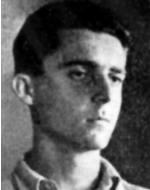Ringibirt, Mordechai (Motke)
Son of Matilda and Hermann (Zvi) was born in June 1928 in the city of Fiume, Transylvania, to a well-known and respected family of Jews and Christians alike. From a young age his friends differed in his qualities. He was quiet and serious and did not like the usual children’s games. By the time he was five years old he could read, and at that age he had been deprived of his mother. His imagination was highly developed. His questions, which remained unanswered, often caused his parents to be embarrassed. To his friends, the children looked a little strange, but they respected him, because he was a peace seeker and a mediator between rivals. Although he did not like fighting, it was right to give a beating to a child who had done his friends wrong. He was confident and his opinions aroused attention among his contemporaries. Mordecai Shaked, who worked on various inventions, was interested in planes and submarines. Among other things, he established a “thrust plane” with his friend “in complete secrecy.” He was also very interested in social problems, and at the age of 16 was familiar with Marxism. He was silent by nature, studying his books and learning. For six years he was a member of the Habonim Federation. On July 16, 1944, he immigrated to Israel and joined a youth company in Afikim, where he joined the Palmach and joined the combat forces during the War of Independence and served in the Yiftah Brigade. Mordechai participated in many battles. In preparation for the first truce, the Yiftah Brigade was demoted to the central region and took part in the fighting in the Latrun area. At the end of the first truce, the brigade participated in the “Dani” operation and on July 17-18, 1948, towards the beginning of the second truce, the “Haemek” Battalion seized Shilat and controlled the eastern part of the Korikor ridge to threaten the wing of the Legion. In the morning it became clear that the Legion force was holding the western part of the ridge. The enemy attacked the force in the outpost from two directions with the aid of armored vehicles, and that was forced to withdraw. In the harsh retreat in an open area under crossfire, many of the fighters fell. This battle fell on the 11th of Tammuz 5708 (18.7.1948). At the time of the attack, he carried on his shoulders a wounded and injured himself, but he continued to carry his friend and machine gun until a second bullet hit him and knocked him down. On the 11th of Adar 5702 (28.2.1950) he was put to rest at the military cemetery on Mount Herzl in Jerusalem.
